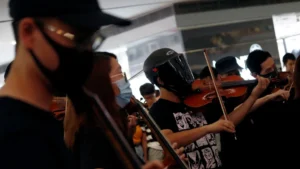YouTube has blocked access to a popular protest song in Hong Kong, a week after a local court accepted the government’s plea to outlaw the hymn.
According to a YouTube statement released on Wednesday, 32 web URLs playing “Glory to Hong Kong” have been blocked and are now unavailable in the semi-autonomous Chinese city due to a court ruling.
Attempts to access the videos from Hong Kong received alerts such as “This content is not available on this country domain due to a court order” or “This video isn’t available anymore.”
YouTube criticized the court order, claiming that it would cast doubt on the government of Hong Kong’s efforts to support the digital economy and restore its standing as a reliable place to do business.
In a statement, YouTube said, “We are disappointed by the Court’s decision but are complying with its removal order.” The company also expressed sympathy for human rights organizations’ worries that the content ban would stifle online free speech. ” We’ll keep thinking through our appeal options in order to advance information access.
The controversial hymn
“Glory to Hong Kong” was written by a musician using a pseudonym in August 2019 and became the unofficial anthem of pro-democracy demonstrations and an unofficial alternative anthem to China’s “March of the Volunteers.” The authorities have long criticized the song’s separatist undertones.
The ballad includes lyrics that reference the protest slogan “liberate Hong Kong, revolution of our times,” which was already banned in 2020. The Hong Kong government and courts claimed the phrase had secessionist and subversive connotations.
The US government has sanctioned Hong Kong officials in recent years for a sweeping national security crackdown on dissent, which has resulted in the imprisonment of many opposition democratic leaders and the closure of liberal media outlets and civil society organizations. In 1997, the former British colony returned to Chinese rule with the assurance that its freedoms would be protected under a “one country, two systems” policy.
George Chen, co-chair of digital practice at Asia Group, a business and policy consultancy with headquarters in Washington, stated that it will be interesting to see how forcefully Hong Kong authorities pursue their demands for the song’s removal from internet platforms.
Chen, who was the former head of public policy for Greater China at Meta, said that if the government begins sending platforms hundreds of links to remove every day, that will likely undermine investor confidence in Hong Kong. “That will harm Hong Kong’s reputation as a leading financial center because we understand how important the free flow of data and information is to a financial center,” – he said – “So, the government should be very cautious and aware of some unintended consequences that may affect its economic recovery and investor confidence.”
According to local media, authorities had previously detained a few residents for performing the song in public without a permit and for other offenses.
The song’s broadcast or distribution ban, according to critics, further curtails the right to free speech since Beijing began cracking down on the former British colony after the 2019 protests. Additionally, they have issued a warning that the ban might impair the tech giants’ operations and reduce the city’s attractiveness as a business hub.












